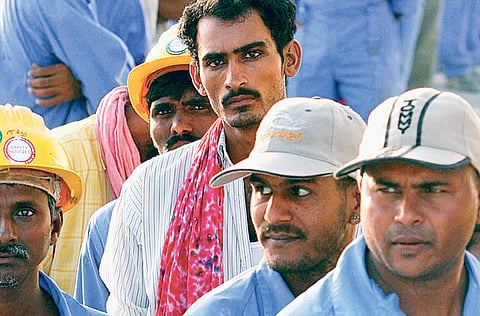GCC countries contemplate greater flexibility for workers
Countries of the GCC seem open to the possibility of allowing labourers greater mobility and flexibility within and among their countries, ILO official says

Dubai: The countries of the GCC, which continue to attract foreign labour of various levels and skills, seem today open to the possibility of allowing labourers greater mobility and flexibility within and among their countries.
The GCC has also begun to develop its own vision with regard to regulating the labour markets in the upcoming decades. This vision includes more nationals, more women and diverse foreign skills, experts say.
"I think they have recognised that they have to be a bit more flexible in allowing the transferability of the worker within the country itself or within the GCC," said Maurizio Bussi, Deputy Regional Director of the Beirut-based International Labour Organisation (ILO) Regional Office for Arab States.
"They are not doing it yet, but they are looking at it, and they would say that it is something that could be of interest to us," Bussi told Gulf News.
From the ILO perspective, Bussi explained, opening the door to greater mobility means saving on the cost of hiring labourers and increasing efficiency as employers could keep workers who possess relevant skills.
Challenges
However, from a government perspective, permitting such mobility could be tricky, as there is a "consolidated view" among the GCC countries that allowing more mobility would mean the workers would stay in the Gulf for longer periods of time. A compromise is needed, according to Bussi.
At present, foreign labourers working in the Gulf region face several restrictions when changing employers within the same country. These restrictions depend on their skill-level and the nature of the job.
However, unskilled or semi-skilled labourers are now allowed to change their employers in Bahrain in the event that their payment has not been received for a certain period of time. Kuwait is heading towards taking the same path.
Last year, the UAE became the first to introduce the wage protection system. The scheme, developed by the UAE Central Bank, is an electronic payment initiative that aims to safeguard workers' wages.
Salaries are paid directly into licensed banks and regulated by the government to ensure payment is made on time with no incorrect deductions, press reports noted.
Now Qatar has taken similar steps. According to the Qatari newspaper The Peninsula, firms are being encouraged to transfer employees' wages into their bank account to ensure swift and regular payments. Workers who have not been paid will be quickly identified and the necessary steps will be taken, officials told the paper.
Officials at the ILO praised the UAE's notable progress in terms of guaranteeing foreign labour rights, particularly the blue-collar workers who constitute almost half the 4.2 million foreign workers in the UAE.
"Wages are paid, accommodation is reasonable and working hours are fine," said Bussi in reference to some of the important rights of labourers.
"If this is the model, this is a good model," Bussi told Gulf News in an interview referring to the Al Raha accommodation outside Abu Dhabi, which has a capacity to absorb nearly 30,000 unskilled and semi-skilled labourers working mainly in construction.
Win-win situation
The economic sector alone employs nearly two million people. Furthermore, "there is a talk on establishing an end of service payment … put in a fund controlled by the (UAE) government," Bussi said.
"The advantage to the government is that you have a credible system, they will use and administer the fund in a productive way, and a guarantee that the employee will go back to his country respected. For the government it is a win-win situation, where you would have a credible system, receive the money, and guarantee that employees are paid," Bussi said.
This week, Dubai is holding a conference on wages. Attendees are expected to discuss how salaries should be determined, how and when they should fluctuate, and which jobs and professions it will include.
"The vision of the government in the next 10 to 15 years is to organise the labour market, so that more Emiratis are working in the private sector, more women are working overall and more diversification of skills [exist] in the workforce," Bussi said.
Despite the fact that unemployment across the GCC is less than the rest of the Arab world, it is surfacing as an economic and social problem, especially because GCC countries are rich and attract foreign labour.
Citizens of the GCC are encouraged to acquire new skills, enter new fields and gain the needed expertise.
Unemployed Arabs numbered 14 million at the close of 2008 setting the rate at 14.37 per cent, according to Arab Labour Organisation (ALO) figures.
The lowest jobless rate was found in Kuwait at 1.33 per cent. Other low GCC figures included Qatar with only 2.4 per cent unemployed and the UAE at 3.12 per cent. In Bahrain, it is around 4 per cent, and 5.63 per cent in Saudi Arabia and 6.7 per cent in Oman.
Handling labour issues require accurate statistics, which is a major challenge in the Middle East, according to Bussi. "There are three types of lies in the world," Bussi said, quoting a British statesman in the 19th century. "Big lies, small lies and statistics."



